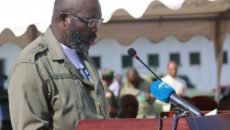MONROVIA, Montserrado – Transparency International has released its 2018 Global Corruption Perceptions Index report, with Liberia still listed among the most corrupt countries in Sub-Saharan Africa.
The 2018 Corruption Perceptions Index measures the perceived levels of public sector corruption in 180 countries and territories. The index draws on 13 surveys of businesspeople and expert assessments and scores on a scale of zero (highly corrupt) to 100 (very clean).
Like last year, Transparency International disclosed that this year’s results paint a sadly familiar picture, as more than two-thirds of countries scored below 50, with an average global score of 43.
“Perhaps most disturbing is that the vast majority of countries assessed have made little to no progress. Only 20 have made significant progress in recent years,†the international watchdog disclosed.
Liberia scored 32 points and ranked 120 among 180 countries around the world, slightly ahead of Guinea and Sierra Leone, which obtained 30 and 28 points, respectively.
Last year, the country scored 31 points and ranked 122 among 180 countries, also slightly above of Guinea and Sierra Leone, which obtained 27 and 30 points, respectively.
Liberia’s score has dropped by nine points since 2012, when the country had a score of 41.
Despite the slight increase of one point in 2018, the country is paired with its neighbors, Sierra Leone and Guinea as among the most declining countries in Sub-Saharan Africa in the fight against corruption.
Anderson Miamen, the executive director for the Transparency International local affiliate, the Center for Transparency and Accountability or CENTAL, said the organization is deeply concerned about the country’s continuous poor performance in the fight against corruption.
Miamen said violations of the Code of Conduct and limited moral and financial support to integrity institutions are counterproductive to Liberia’s fight against corruption.
“This speaks to [the] government’s inability to address [the] entrenched culture of impunity and enforce existing anti-corruption laws, and perhaps limited or no efforts to audit the past public officials,†he said.
The local transparency group wants President George Weah to ensure that all government officials declare their assets, incomes, and liabilities as recommended in the Code of Conduct and comprehensively audit members of the past administration.
Following the release of last year’s report, CENTAL also called on the president to take tangible steps to promote transparency and accountability in Liberia.
While taking office last year, Weah promised to end corruption. He also reiterated his commitment during his official visit to France as president.
With one year already elapsed into his administration, Weah’s actions so far have shown a lack of sincerity or political will to tackle corruption. In the earlier stage of constituting his government, Weah removed Konah Karmoh, the head of secretariat of the Liberia Extractive Industries Transparency Initiative, the main watchdog for the extractives industry.
As a result, he was heavily criticized both at home and by the international anti-corruption watchdog, Global Witness, which noted that his action was against the law.
The Extractive Industry Transparency Initiative, with which LEITI was affiliated, also announced that it had suspended Liberia from its membership on September 4 for failing to publish its EITI report for the fiscal period ending June 2016 on July 1, this year.
Weah was also accused of appointing people close to him to senior positions. The current head of the Liberia Civil Aviation Authority appointed by the president was also not legally qualified for the position. Also, despite a law for public officials to declare their assets upon taking office, the president did not declare his asset or encourage his officials to do so until six months after he was pressured by members of the opposition to do so. Even with his late declaration, the declaration is yet to be published.
Last year, the executive chairperson of the Liberia Anti-Corruption Commission, James Verdier, told The Bush Chicken that despite public pronouncements, there was no real action to fight corruption. He said it was unfortunate that there had been no high-level discussion among government agencies on the issue.
“I can’t say what this government’s position regarding fighting [corruption] is, if there’s anything new,†Verdier said.
He said the three branches of the government need to work better together: “We should all be in sync with what the country intends to achieve, what the country is doing, and what are the efforts that are going to be put in place to make sure that we fight corruption. Currently, we don’t have that kind of coordination; we don’t have that kind of understanding.â€
He said that a sign of the government’s attitude was a cut in the budget allotment to his commission, reduced by US$300,000 from US$2,312,672 last fiscal year to US$2,008,362 in the current fiscal year. Verdier also pointed out that in the current budget, the commission has no allotment for litigation.
“This is the institution that is supposed to pursue prosecution of people who are accused of corruption. How do we do that when we don’t have any fees for litigation?†he said.
Due to the budget, he said the commission is struggling to retain seven of its investigators who were trained and hired under a UNDP-funded project that has now elapsed.
Last week, the president for the second time addressed the legislature on the state of the nation, but did not mention “corruption†at all in his two-hour speech.



